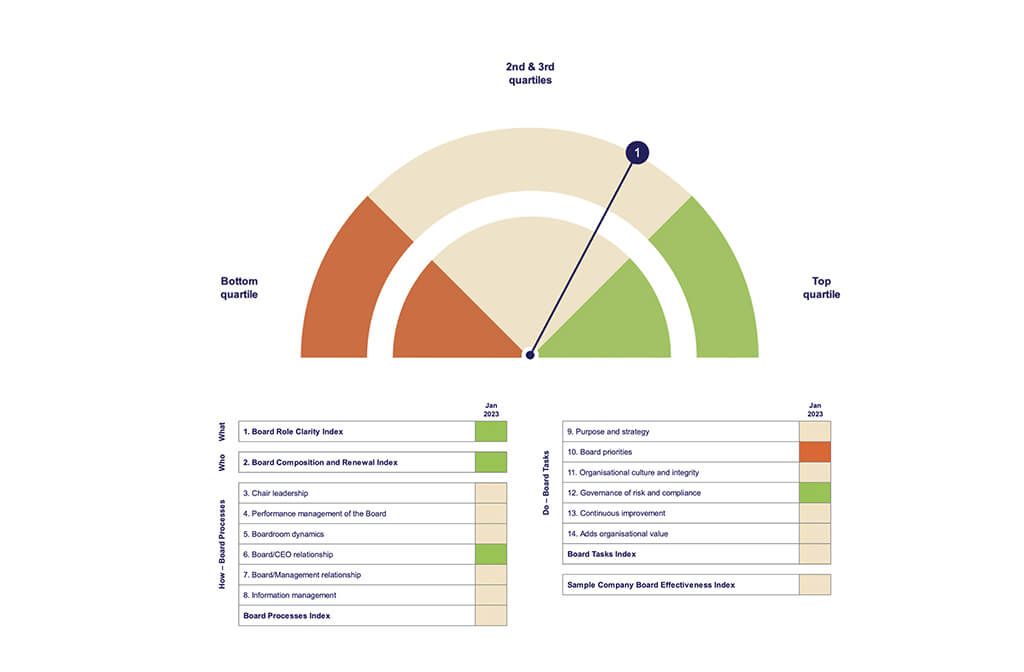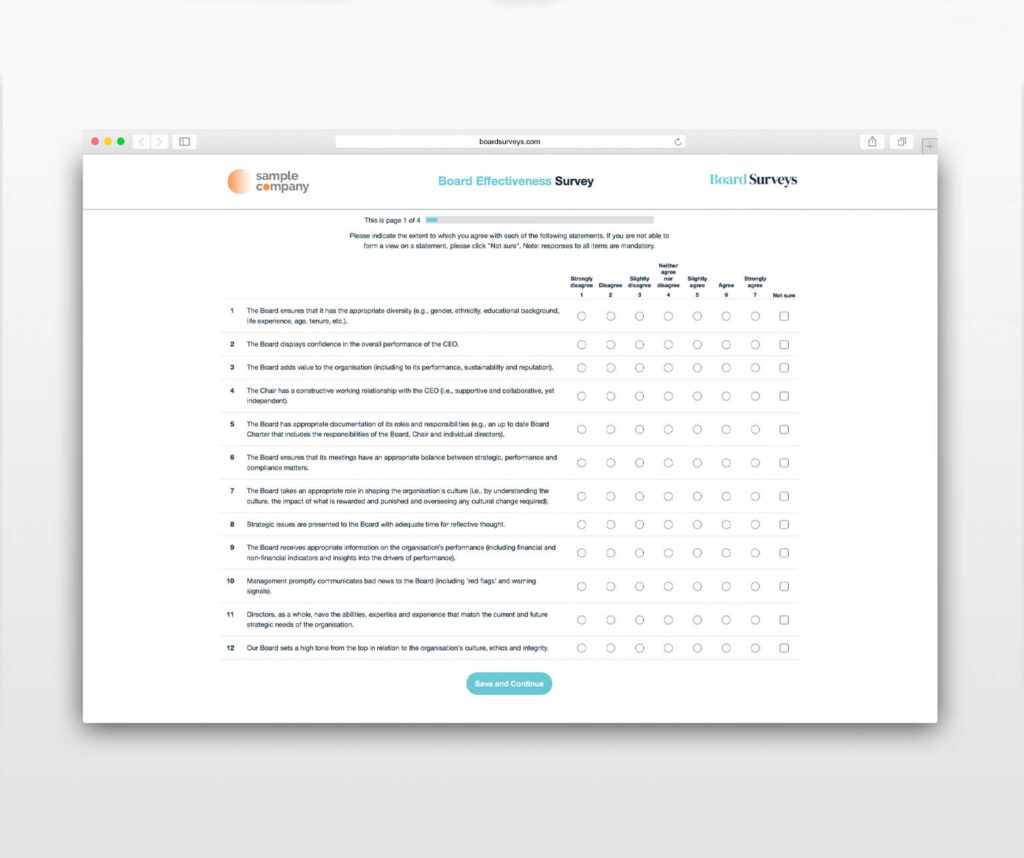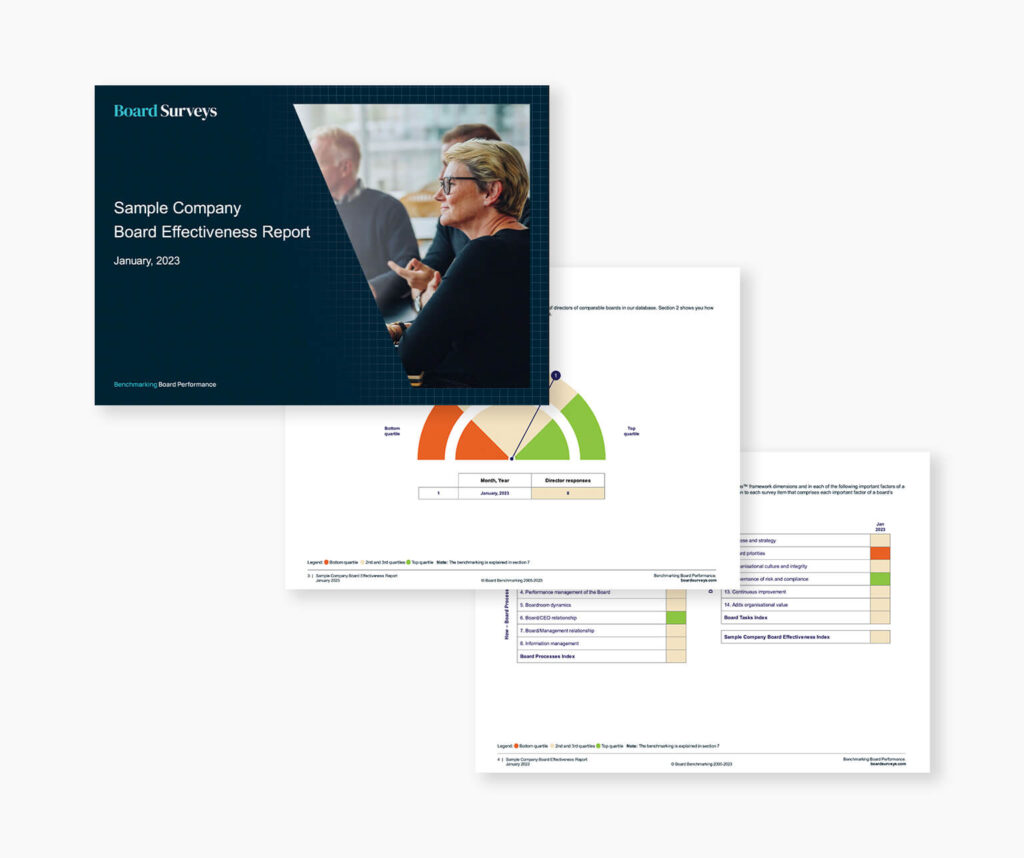Board Effectiveness
Assessments
Want to discuss how our surveys could help facilitate your next board effectiveness assessment?
Complete the contact form below and a Board Surveys expert will be in touch.
"*" indicates required fields
Our Board Effectiveness Assessments
Whether you’re looking for a lite-touch or a comprehensive assessment for your upcoming board evaluation, we have the survey to suit your needs. Select from our two world-class Board Effectiveness Surveys and measure your performance relative to similar boards.
Free Trial
Effectiveness Survey
Lite
Effectiveness Survey
Essentials
Effectiveness Survey
There are over 500 boards to compare you with






What can benchmarking tell us?
Our comparative benchmarked reports provide an immediate snapshot of your strengths as well as areas for enhancement. These reports are crafted to inspire change and action, clearly highlighting the areas your board could improve upon in the forthcoming year.

Key Benefits
Benchmarked Reporting
See how your board measures up at a glance with easy to understand reporting.
Designed for All
Affordable survey options that are designed to be used by boards of all shapes and sizes.
Validated Survey Items
After over 500 board reviews we only measure what is meaningful when it comes to board effectiveness.
Transformative Insights
Simple, clear reporting lets you gain insights that are designed to be change-oriented.
Refined Process
You are guided through a self-managed process that has been designed to be as streamlined and intuitive as possible.
<span data-metadata=""><span data-buffer="">Dig a little deeper
Need help interpreting and acting on your report? Our global network of experts are here to help.
Don’t take our word for it








Undertaking a Board Effectiveness Assessment.
Unlike other online survey providers, we are transparent with our framework, process and pricing. Our streamlined and intuitive self-managed process results in a more affordable survey option that still has all the advantages of a world-class validated framework and benchmarked reporting
Upon closing your survey we will send out your world-class intuitive benchmarked report within 48 hours to your designated contact (usually your Chair). If you need help interpreting and acting on your report our global network of partners are available to assist you.


Frequently Asked Questions
Understanding Board Effectiveness is crucial for any organisation aiming for success and sustainability. These FAQs shed light on this integral aspect of corporate governance, examining the factors that contribute to effective boards, how to measure and improve board performance, and the role of diversity, size, and leadership within this context.
Use this resource to gain insights that can help optimise your board’s effectiveness, driving strategic decisions and enhancing your organisation’s performance.
What is meant by Board Effectiveness?
Board Effectiveness refers to the ability of a company’s board of directors to competently perform their responsibilities in governing the company. This includes setting company direction, making critical decisions, supervising executive management, ensuring corporate compliance, and optimising company performance.
Why is Board Effectiveness important?
Board Effectiveness is crucial because the board’s performance significantly impacts the overall success and sustainability of an organisation An effective board ensures the organisation stays focused on its strategic goals, adheres to regulatory standards, makes well-informed decisions, and creates shareholder value.
What are the key factors that contribute to Board Effectiveness?
Key factors include a well-balanced mix of skills, diversity, clear roles and responsibilities, board size, effective board leadership, active participation from board members, strategic focus, robust decision-making processes, effective communication, and ongoing board education and training.
How can Board Effectiveness be measured?
There are several ways to measure board effectiveness, including regular board evaluations, assessing the board’s contributions to strategic decision-making, monitoring company performance, and using established governance models and metrics.
What is a Board Effectiveness review?
A Board Effectiveness review is a process where the board’s performance is evaluated, often annually. It might involve self-assessments, peer reviews, feedback from management, and external independent evaluations. The review covers various areas such as board composition, processes, responsibilities, and performance.
What is the role of the chairman in Board Effectiveness?
The chairman plays a critical role in board effectiveness. The chairman is responsible for leading the board, setting the meeting agendas, ensuring robust decision-making, fostering a constructive board culture, and enabling open and effective communication among directors.
What is the impact of board diversity on Board Effectiveness?
Board diversity, including gender, ethnicity, skills, and experience, can enhance Board Effectiveness by bringing a wider range of perspectives, stimulating more innovative thinking, promoting better decision-making, and enhancing company reputation.
How does board size impact Board Effectiveness?
Board size can have a significant impact on board effectiveness. A small board may lack the diversity of skills and experience, while a large board may hinder efficient decision-making and communication. The optimal size depends on the company’s complexity, stage of development, and specific needs.
What role does corporate governance play in Board Effectiveness?
Corporate governance is central to board effectiveness. It provides the framework for how a company is directed and controlled. Effective corporate governance ensures accountability, fairness, transparency, and responsibility, which all contribute to an effective board.
What actions can be taken to improve Board Effectiveness?
Improving Board Effectiveness may involve measures such as aligning the board’s skills with the company’s strategy, enhancing board diversity, refining board processes, defining clear roles and responsibilities, improving board education and training, conducting regular board evaluations, and strengthening board leadership.
What is the role of board committees in Board Effectiveness?
Board committees, such as audit, nomination, or remuneration committees, play a crucial role in Board Effectiveness. They allow detailed consideration of complex issues, which enhances the board’s overall functioning and decision-making. Each committee should have a clear mandate, sufficient resources, and competent members.
What are the common challenges that can affect Board Effectiveness?
Common challenges to Board Effectiveness can include lack of diversity, ineffective leadership, poor decision-making processes, lack of strategic focus, insufficient board self-assessment, conflict of interest issues, and ineffective communication within the board.
How does a board's relationship with the CEO impact Board Effectiveness?
The board’s relationship with the CEO is crucial to Board Effectiveness. A strong, open, and constructive relationship ensures alignment between board and management, facilitates effective oversight, and promotes better decision-making. The board also plays a key role in selecting, evaluating, and if necessary, replacing the CEO.
Why is continuous learning and development important for Board Effectiveness?
Continuous learning and development is key to Board Effectiveness because it ensures that board members stay informed about changes in the business environment, industry trends, and governance best practices. It equips them with the knowledge and skills needed to make strategic decisions and to oversee company performance effectively.